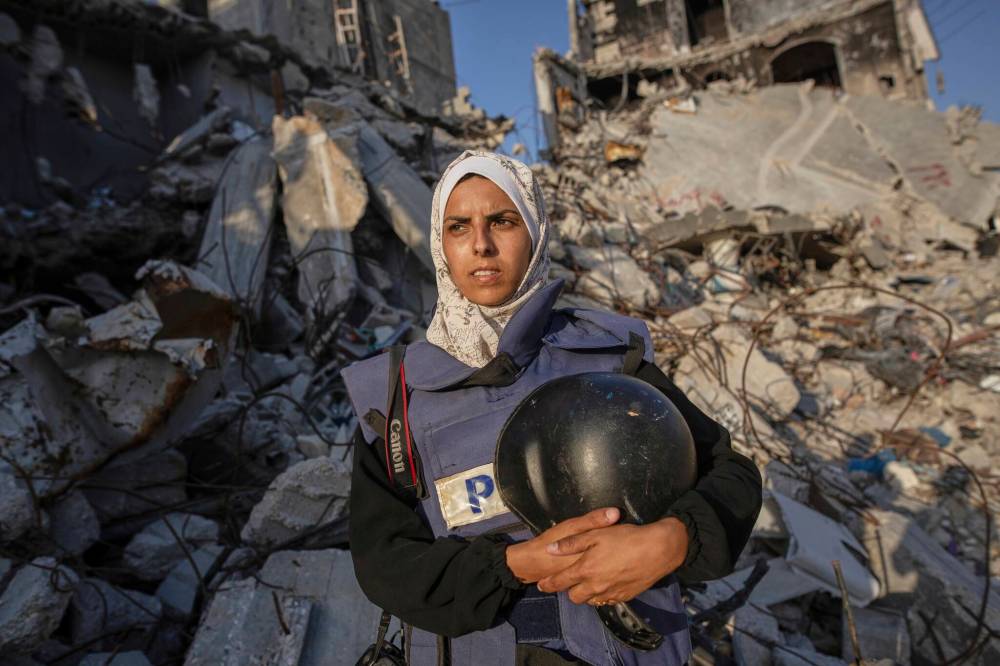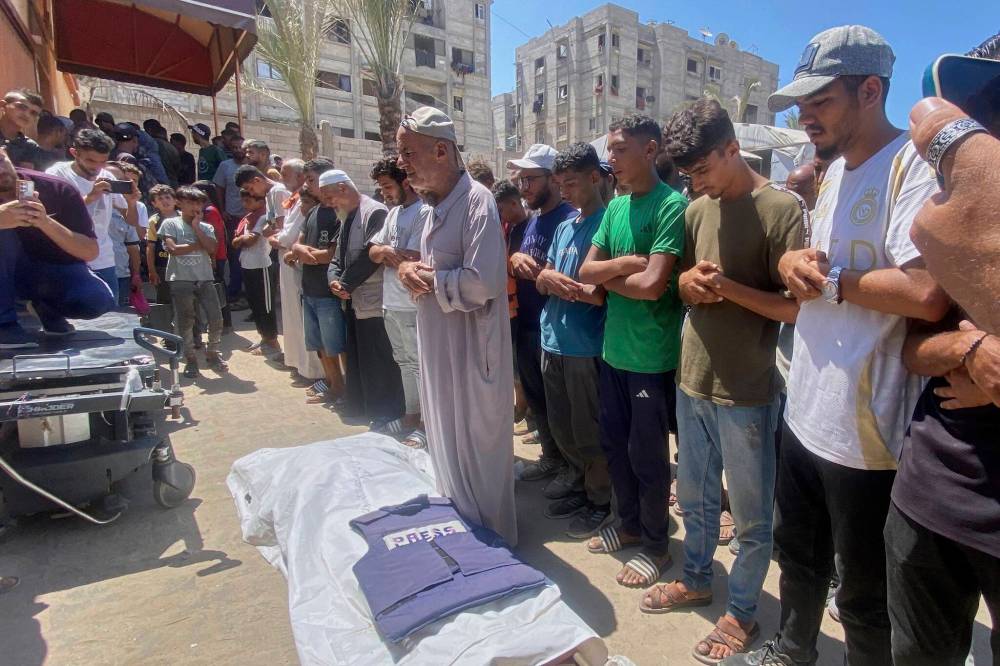5 journalists killed in Israeli attacks on Gaza hospital, health officials say
Advertisement
Read this article for free:
or
Already have an account? Log in here »
We need your support!
Local journalism needs your support!
As we navigate through unprecedented times, our journalists are working harder than ever to bring you the latest local updates to keep you safe and informed.
Now, more than ever, we need your support.
Starting at $15.99 plus taxes every four weeks you can access your Brandon Sun online and full access to all content as it appears on our website.
Subscribe Nowor call circulation directly at (204) 727-0527.
Your pledge helps to ensure we provide the news that matters most to your community!
To continue reading, please subscribe:
Add Brandon Sun access to your Free Press subscription for only an additional
$1 for the first 4 weeks*
*Your next subscription payment will increase by $1.00 and you will be charged $20.00 plus GST for four weeks. After four weeks, your payment will increase to $24.00 plus GST every four weeks.
Read unlimited articles for free today:
or
Already have an account? Log in here »
DEIR AL-BALAH, Gaza Strip — Israeli strikes on a hospital in southern Gaza killed five journalists Monday, according to health officials, including one who days earlier had reported for The Associated Press on children being treated for starvation at the same facility.
Mariam Dagga, 33, a visual journalist, freelanced for AP and other news outlets during the war. The news organization said in a statement that it was shocked and saddened to learn of Dagga’s death, as well as the deaths of other journalists.
“We are doing everything we can to keep our journalists in Gaza safe as they continue to provide crucial eyewitness reporting,” AP said.

Freelance journalist Mariam Dagga, 33, who had been working with The Associated Press and other outlets during the Gaza war, poses for a portrait in Khan Younis, southern Gaza Strip, on June 14, 2024. She was among at least 19 people, including five journalists, killed Monday in Israeli strikes on Nasser Hospital in Khan Younis. (The Associated Press files)
Two strikes hit Nasser Hospital in Khan Younis in quick succession, medical officials said. In videos, journalists and rescue workers can be seen rushing to the scene of the first one, before a massive explosion hits an exterior staircase where journalists are often stationed.
In all, 20 people were killed, according to Zaher al-Waheidi, head of the Gaza Health Ministry’s records department.
Israeli Prime Minister Benjamin Netanyahu’s office said the strike was a “tragic mishap” and that the military was investigating.
“Israel values the work of journalists, medical staff, and all civilians,” his office said in a statement.
The military said it “regrets any harm to uninvolved individuals and does not target journalists as such.”
Israeli media reported that Israeli troops fired two artillery shells at the hospital, targeting a Hamas surveillance camera on the roof.
Reuters said that ahead of the first strike, it was showing a live video feed filmed from the hospital when the feed suddenly shut down. The journalist filming the live video was killed in the first strike, Reuters said, citing hospital officials.
Video obtained by AP shows people climbing the external stairwell of the hospital just after the first strike — and then the thundering boom of the second strike.
The AP and Reuters demanded an explanation in a joint letter to Israeli authorities.
“We are outraged that independent journalists were among the victims of this strike on the hospital, a location that is protected under international law,” it said. “These journalists were present in their professional capacity, doing critical work bearing witness.”
The Israel-Hamas war has been one of the bloodiest conflicts for media workers, with 189 Palestinian journalists killed by Israeli fire in Gaza in the 22-month conflict, according to the Committee to Protect Journalists. Comparatively, 18 journalists have been killed so far in Russia’s war in Ukraine, according to the CPJ.
Many journalists working in Gaza face the same struggles to find food, for themselves and their families, as the people they cover. Dagga’s 13-year-old son was evacuated from Gaza earlier in the war and she herself was displaced multiple times.
Al Jazeera confirmed that its journalist Mohammed Salama was also among those who were killed in the Nasser strikes. Middle East Eye, a U.K.-based media outlet, said Salama had also contributed to its coverage.
Reuters reported that its contractor cameraman Hussam al-Masri and Moaz Abu Taha, a freelancer who worked occasionally for the organization, were killed. The agency’s contractor photographer Hatem Khaled was wounded.
Ahmad Abu Aziz was also killed, according to Health Ministry official al-Waheidi. He had worked as a freelancer for Middle East Eye, the organization said.

In this family handout photo, Riyad Dagga (centre) and other relatives and friends pray over the body of his daughter, freelance journalist Mariam Dagga, 33, during her funeral after she was killed in a double Israeli strike on Nasser Hospital in Khan Younis, southern Gaza Strip on Monday. (The Associated Press)
Dagga frequently based herself at Nasser, most recently reporting on the hospital’s struggle to save children from starvation, including making a series of searing images. Independent Arabia, the Arabic language version of the British Independent, said Dagga also worked with the organization.
She often shared short, sombre Facebook posts, reflecting on her life in Gaza. In one of her last, on Sunday, she wrote: “When you see the soil covering the most precious thing you have, only then will you realize how trivial life is.”
Thibaut Bruttin, the director general of Reporters Without Borders, said press freedom advocates had never seen such a severe step backward for reporters’ safety. He noted that journalists have been killed both in indiscriminate strikes and in targeted attacks that Israel’s military has acknowledged carrying out.
“They are doing everything they can to silence independent voices that are trying to report on Gaza,” Bruttin said.
The deadliest day for journalists in the Gaza war, according to the CPJ, was two weeks ago, when six journalists were killed, including Al Jazeera correspondent Anas al-Sharif. The channel said that with Monday’s strike, 10 journalists associated with the network have been killed in Gaza. Reporters Without Borders called for an emergency UN Security Council meeting to examine what it called Israel’s failure to uphold the UN resolution protecting independent journalists in times of conflict.
A spokesperson for Volker Türk, the UN high commissioner for human rights, said journalists working in Gaza while their international colleagues are denied entry must be protected.
“The killing of journalists in Gaza should shock the world — not into stunned silence — but into action, demanding accountability and justice,” chief spokesperson Ravina Shamdasani said.
Israel’s security council is expected to meet Tuesday to discuss the plans for an expanded operation in Gaza and the ceasefire negotiations.
Aside from rare guided tours, Israel has barred international media from covering the war. News organizations instead rely largely on Palestinian journalists in Gaza — as well as residents — to show the world what is happening there. Israel often questions the affiliations and biases of Palestinian journalists but doesn’t permit others in.
The Foreign Press Association, which has petitioned Israel’s Supreme Court over Israel’s decision to block journalists from accessing Gaza, made an emotional plea on Monday.
“Too many journalists in Gaza have been killed by Israel without justification,” the organization said in a statement. “This must be a watershed moment. We appeal to international leaders: Do everything you can to protect our colleagues. We cannot do it ourselves.”
» The Associated Press
